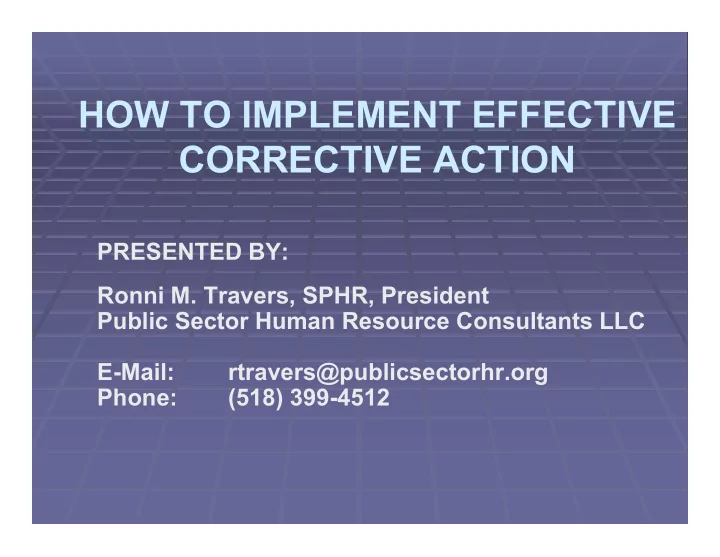

HOW TO IMPLEMENT EFFECTIVE CORRECTIVE ACTION PRESENTED BY: Ronni M. Travers, SPHR, President Public Sector Human Resource Consultants LLC E-Mail: rtravers@publicsectorhr.org Phone: (518) 399-4512
How Does the Pareto Principle (80/20 Rule) Apply to Managing Employees?
What is Corrective Discipline? Action taken by the employer when an employee is guilty of misconduct or incompetence
What Direction are you Going? Correct the Behavior Terminate the Employee
When it comes to implementing Corrective Discipline, what problems have you faced?
Before you Point the Finger , ask yourself… Do I have a policy? Have I communicated this policy to you? Have I consistently applied this policy throughout the department?
Policies to Consider Collective Bargaining Agreement(s) Employer Policies, Procedures and Work Rules Departmental Policies, Procedures and Work Rules Federal, State and Local Rules and Regulations
What about Job Performance? Are job descriptions current? Do employees have a copy? Do employees know Your Expectations ? Do you evaluate employees during the Probationary Period? When? Do you conduct annual evaluations?
Guidelines for an Effective Corrective Discipline Program 1. Decisions regarding disciplinary action should be centralized 2. Know the difference between “counseling” and “disciplining” employees 3. Counseling forms should be standardized and used by all departments
Guidelines for an Effective Corrective Discipline Program (cont.) 4. Application and enforcement of policies, procedures, and work rules should be consistent 5. Immediacy of action is critical 6. Conduct an investigation before imposing any corrective action. Document the investigation
Guidelines for an Effective Corrective Discipline Program (cont.) 7. Penalties imposed should consider the employment history of the employee 8. Successive acts of misconduct should result in progressively harsher penalties (never go backwards or stay at one level of discipline)
Guidelines for an Effective Corrective Discipline Program (cont.) 9. Decisions should not be based upon the heat of the moment 10. Remain objective, personal feelings have no place in an effective disciplinary program 11. Document counseling sessions and disciplinary actions
Counseling Employees Effective Management Tool First Step in Dealing with Employee Performance Problems Determine when to use Counseling rather than Discipline
Tips for Preparing for a Counseling Session Continue Start Stop
Guidelines for Writing a Counseling Memo Write the memo to the employee BEFORE counseling session and review with the employee during the session If necessary, revise after the session Use facts to support the performance to be addressed
Components of an Effective Counseling Memo 1. Purpose of Counseling Session 2. Performance to be Addressed 3. Improvement Plan 4. Failure to Comply 5. Employee Comments
Components of an Effective Counseling Memo 6. Follow-up Date 7. Supervisor Signature and Date 8. Employee Signature and Date
Common Problems in Counseling Memos Failure to have the employee acknowledge receipt in writing Memo not timely (months after incident) Using “supposedly” or “it was alleged” which imply uncertain facts
Common Problems in Counseling Memos (cont.) Statements that “further disciplinary action will occur” Instead state “Your failure to comply in the future will result in formal disciplinary action up to and including termination of employment in accordance with (state proper reference).”
BIGGEST PROBLEM! Counseling Memo does not include a Performance Improvement Plan
Disciplinary Procedures : 1. NYS Civil Service Law Section 75 2. Union Disciplinary Procedures
Stipulation of Settlement Agreement Under certain circumstance and with proper authorization from the proper authority, the parties can agree to a Stipulation of Settlement Agreement
Workplace Investigations 1. Employee Responsibilities During a Workplace Investigation 2. Employee Right to Union Representation 3. Role of the Union Representative 4. Workplace Investigation Form
Employee Responsibilities During Workplace Investigation The employee has a duty to cooperate and answer your questions truthfully The employee can not withhold information The employee is responsible for his/her own choice of cooperating or not
Employee Responsibilities During Workplace Investigation Under appropriate circumstances, the employee can be disciplined for failure to cooperate If the employee refuses to answer your questions, a decision will be based upon existing facts and sources of information.
Right to Union Representation Apply to employees covered by a collective bargaining agreement Employees have a right to ONE union representative at investigatory interviews if they are the subject of the investigation
Garrity Rights Garrity v. New Jersey. Supreme Court held that law enforcement officers and other public employees have the right to be free from compulsory self-incrimination during a workplace investigation involving possible criminal activity Burden is placed on the employee to assert his or her Garrity Rights
Garrity Rights (cont.) Garrity does not protect employees from disciplinary action An employee can be ordered to discuss a matter during a workplace investigation that may be held against them in future disciplinary proceedings
WHY IS IT IMPORTANT TO DOCUMENT? The burden of proof is always on the employer. It is the responsibility of the employer to prove not only that the employee did commit the act, but that an organized procedure of corrective and progressive discipline was taken.
WHY IS IT IMPORTANT TO DOCUMENT? The following information will be required in any proceeding: The employer gave proper advance notice to all employees of the policy The policy was reasonable and related to the orderly and efficient operation of the organization The employee being disciplined did, in fact, commit the violation
WHY IS IT IMPORTANT TO DOCUMENT? The employer must show the policy is applied consistently where it is appropriate to do so The degree of discipline is reasonable and appropriate to the violation Any evidence used in the Corrective Discipline process must be retained for the record and for any future claims that may be filed
In Summary… To be effective, corrective action should be approached as a strategy of corrective instruction in which the supervisor and employee respectfully work together to improve the employee's performance.
Recommend
More recommend